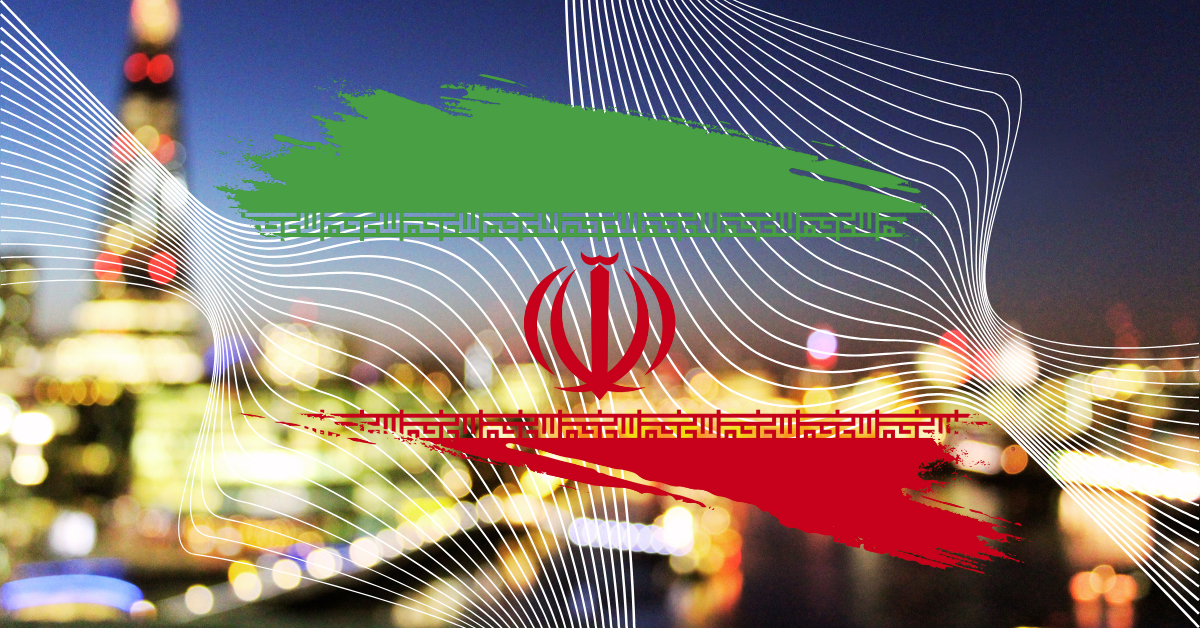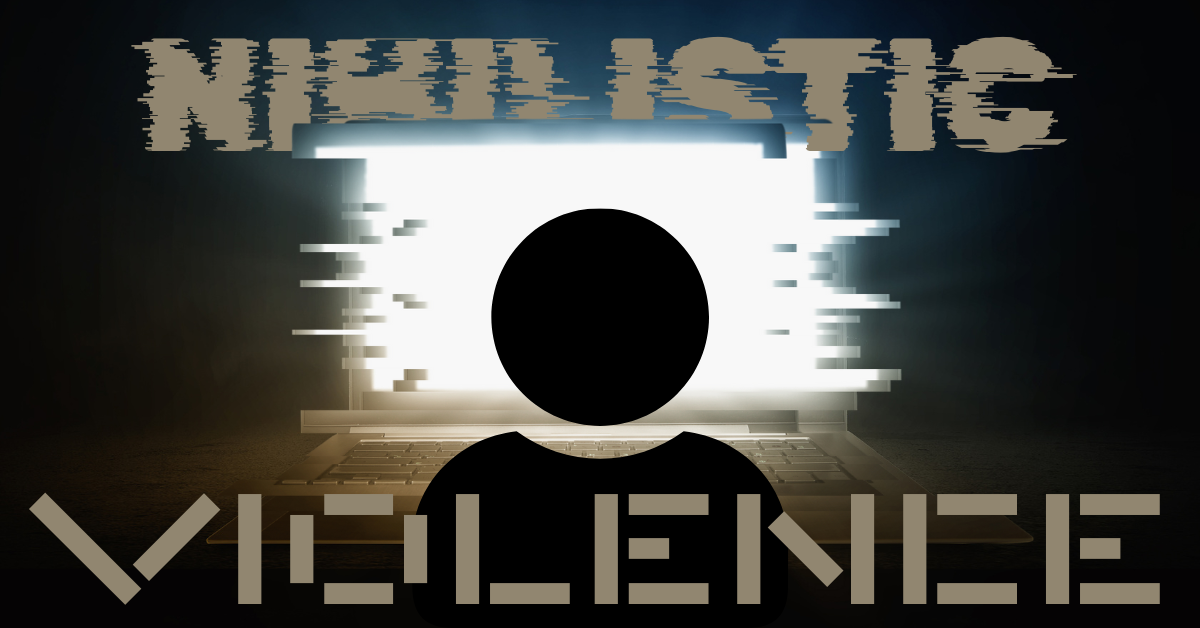Francophone fallout: Understanding narratives promoted by right-wing extremists in Quebec around the Israel-Hamas conflict
26 June 2024
This briefing outlines how French-speaking right-wing extremists in Quebec have engaged with ongoing events related to the Israel-Hamas conflict. It is part of a research series examining the impacts of the Israel-Hamas conflict on extremism, hate and disinformation in Canada. This project has been made possible in part by the Government of Canada. All views are ISD’s own.
Analysis of French-language social media content around the Israel-Hamas conflict associated with right-wing extremists[1] in Quebec on X (formerly Twitter), shows a predominant focus on spreading anti-Islam sentiments. This includes seeding fears around a supposed ‘Islamisation’ and foreign infiltration of Quebec in relation to the conflict. Additionally, right-wing extremists in Quebec have targeted the local pro-Palestine movement online, comparing protesters to Nazis; accusing protesters in general of supporting Hamas; and promoting the ‘Pallywood’ conspiracy theory which falsely accuses Gazans of staging injury and death online.
As this briefing shows, the positions of right-wing extremists in Quebec share more similarities with those of right-wing extremists in France than with those in Anglophone Canada. For instance, right-wing extremists in Quebec make relatively limited use of antisemitic ideas and narratives compared to their counterparts in Anglophone Canada, and instead present themselves as advocates for women, the LGBTQ+ community and other vulnerable communities in the context of the Israel-Gaza conflict. However, some of the narratives shared by right-wing extremists in Quebec have also been observed in ISD’s analysis of Anglophone Canada.
The analysis below is based on a qualitative, observational analysis of 29 right-wing extremist accounts self-identifying as being in Quebec engaged in discussions around the Israel-Hamas conflict between 7 October 2023 and 12 May 2024.[2]
Key Findings
- French-language right-wing extremists in Quebec have, in their discussions of the Israel-Gaza conflict, focussed primarily on anti-Islam sentiments, spreading concerns around the supposed ‘Islamisation’ of Quebec.
- Quebecois right-wing extremists have targeted pro-Palestine movements in online spaces, comparing protestors to Nazis or accusing them of supporting Hamas, and promoting claims that Gazans are ‘faking’ injury and death.
- Right-wing extremists in Quebec share more similarities in their positions with French extremists than those in Anglophone Canada. Antisemitic narratives were limited, with extremists instead portraying themselves as advocates for vulnerable communities and demographics.
Background on Right-Wing Extremism in Quebec
Unlike their Anglophone Canadian counterparts, right-wing extremists in Quebec seem to have been less influenced by movements in the US, but rather strongly emphasise the French heritage of Quebec. Prominent right-wing extremist groups such as ‘La Meute’ (‘The Pack’) argue that Quebec has become disconnected from its history and culture, making it vulnerable to Islamism. They allege that Muslims are infiltrating Quebec, imposing their religion and values on the local population while threatening the French language and secularism of the state. As outlined in this article, qualitative analysis reveals some overlaps between the talking points of right-wing extremists with broader narratives around Quebec nationalism, with advocacy for Quebec’s independence from the rest of Canada and the preservation of its unique culture intermingled with a desire to protect Quebec from alleged foreign and Muslim influence.
Such activity sits within a broader polarised political context. Quebec’s Laicity Act, passed in 2019 and commonly referred to as Bill 21, bans civil servants including public teachers, policer officers and government lawyers from wearing religious symbols at work. Researchers have pointed out that in addition to potentially stigmatising Muslim women – and other non-Christian groups with visible religious clothing or symbols such as Jews and Sikhs – the bill may have precipitated an increase of hate crimes against Muslims more generally, and also risks signalling to right-wing extremists that their views have mainstream support.
Spotlight on Narratives
This section presents a selection of the most common narratives around the Israel-Hamas conflict shared by social media accounts in Quebec that have been identified by ISD analysts as right-wing extremist. It also explores differences and commonalities between the narratives of right-wing extremists in Quebec and Anglophone Canada around the conflict.
Quebec and wider Canadian right-wing extremism: Overlaps and divergence
Despite belonging to distinct online ecosystems, there are some overlaps between the narratives of right-wing extremist in Quebec and in the social media activity of English-language Canadian right-wing extremist accounts around the Israel-Hamas conflict. For example, both groups frequently claim that solidarity for the people of Palestine means supporting terrorism, and that Palestinians are all members of Hamas or Nazis. Right-wing extremist social media users across Canada also make links between solidarity shown for Palestine, mass immigration and the ‘Great Replacement’ conspiracy theory.
However, accounts and posts originating from Quebec featured notably lower levels of antisemitic rhetoric. One possible explanation for this is that right-wing extremists in Quebec typically prioritise anti-immigrant rhetoric, similar to Marine Le Pen and France’s Rassemblement National (RN), who have in the past sought to distance themselves from antisemitism. Like right-wing extremist groups in France, right-wing extremists in Quebec have also at times claimed to defend women and minorities including the LGBTQ+ community from what they describe as ‘Islamic fundamentalism’ (a term deployed very loosely).
Narrative 1: The conflict in Gaza is part of the ‘Islamisation’ associated with the ‘Great Replacement’
Right-wing extremists in Quebec have linked the conflict in Gaza and pro-Palestine protests to the ‘Great Replacement’ conspiracy theory, which is commonly used by right-wing extremist groups globally. This right-wing extremist concept claims that white populations in Western countries are being deliberately replaced at an ethnic and cultural level through migration and the growth of non-white ethnic and religious minority groups – primarily Muslims. Proponents attempt to create a sense of urgency to act by arguing for the possibility of ethnically white populations becoming minority groups in Western countries.
In Quebec, right-wing extremists use the hashtags #Remigration and #GrandRemplacement when referring to Gaza and the pro-Palestine movement. They also claim that there is an alliance between Islamists and the left, using the term ‘Islamo-gauchiste’ (‘Islamist-leftists’).
Posts from these accounts often aim to cast doubt on the objectives of pro-Palestine protestors. This includes claims that Muslim prayers at pro-Palestine protests are a plan to force Canadians to convert to Islam. Accounts also accused ‘Islamo-gauchiste’ protestors of “taking over” universities, after McGill University students attached stickers with Palestinian city names to more than 30 campus buildings, while students at Harvard University in the US flew a Palestinian flag. One post alleged that McGill students wanted to introduce a ‘Shariah Controlled Zone’ in Montreal (Image 1), echoing myths around ‘no go zones’ from other countries.
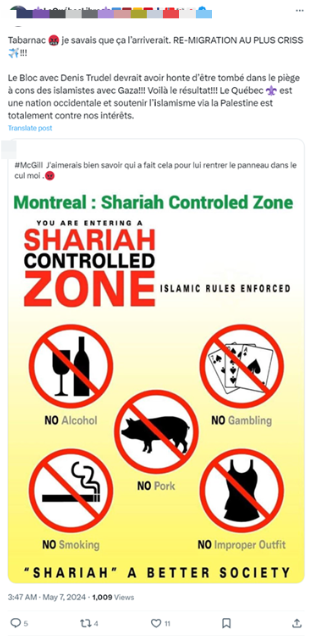
Figure 1: Post on X claiming that pro-Palestine supporters at McGill University want to introduce a Shariah controlled zone. Translation account sharing: “Fuck. I knew that this was coming. Re-migration at the most Christ!!!! Denis Trudel’s Bloc should be ashamed of falling into the Islamists’ asshole trap with Gaza!!!! Here’s the result!!!! Quebec is a Western nation and supporting Islamism via Palestine is totally against our interests.” Translation original post: “#McGill. I’d like to know who did this to shove the sign up his arse.”
While among Anglophone Canadian right-wing extremists it is more common to see the Great Replacement presented through a strongly antisemitic worldview, right-wing extremists in Quebec instead focus on anti-migration and anti-Islam rhetoric by claiming that the Israel-Gaza conflict is part of a global process of ‘Islamisation’.
Narrative 2: ‘Supporting Palestine means supporting Islamists’
A related set of narratives assessed as part of this research have made the claim that support for Palestine is akin to supporting Islamists. Posts around this theme often argue that Palestinians are misleading their supporters into allowing Islamists to take over. One right-wing extremist account from Quebec with 975 followers states that while he initially was deceived by Palestinians, he was later able to see their true nature, describing them as “Fanatically religious”, “Antisemitic”, “Dishonest” and “Warlike”, and claiming that Westerners who support Palestine are traitors. The post received 15.6k views, received 207 likes and 83 comments, and was retweeted 52 times.
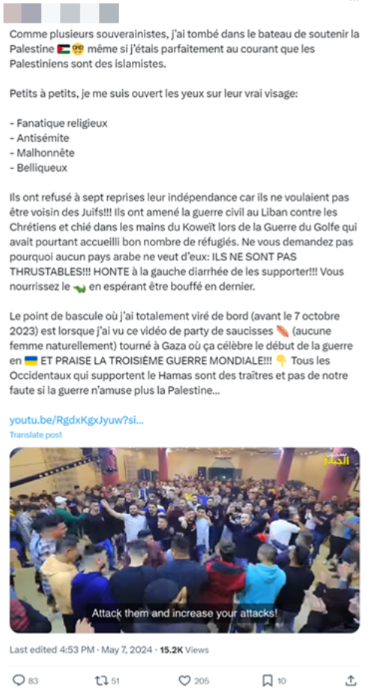
Figure 2: X post talking about Palestinians deluding people in the West
Translation: “Like many sovereigntists, I fell into the trap of supporting Palestine. Even though I was perfectly aware that the Palestinians are Islamists.
Little by little, I opened my eyes to their true face:
– Religious fanatics
– Antisemitic
– Dishonest
– Bellicose
They refused their independence seven times because they didn’t want to live next door to the Jews!!!! They brought civil war to Lebanon against the Christians and shat in the hands of Kuwait during the Gulf War, even though Kuwait had taken in many refugees. Don’t ask yourself why no Arab country wants them: THEY ARE NOT THRUSTABLE (sic)!!!! Shame on the diarrhoeal left for supporting them!!!! You are feeding the crocodile, hoping to be eaten last. The tipping point where I totally turned the corner (before October 7, 2023) was when I saw this sausage party video (no women, naturally) shot in Gaza where it celebrates the start of the war in Ukraine AND PRAISE WORLD WAR III!!!! All Westerners who support Hamas are traitors and it’s not our fault that Palestine is no longer amused by the war…”
Another claim that support for Palestine constitutes support for Islamism was rooted in comparing the left’s support for Palestine in 2024 with support for the Iranian Revolution. This comparison draws parallels to protests held against Shah Mohammad Reza Pahlavi in 1979, which resulted in the overthrow of the monarchy and the establishment of the theocratic Islamic Republic of Iran.
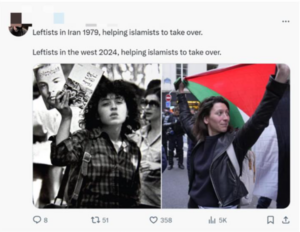
Figure 3: X post comparing Leftists protestors against the Iranian monarchy in 1979 with pro-Palestine protests in 2024
Right-wing extremists in Quebec have also claimed that the pro-Palestine protests at university campuses are supported and funded by Hamas, citing an unverified claim that 75 per cent of protesters are not students, but from Islamist organisations (Figure 5).
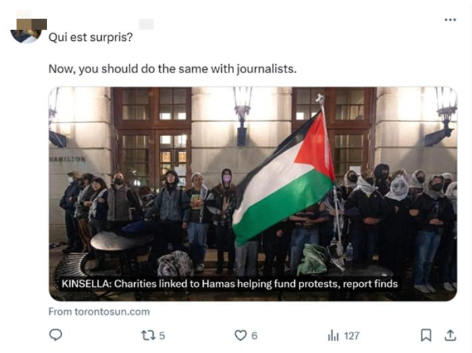
Figure 4: Post claiming that Hamas is funding pro-Palestine protests
Translation: “Who is surprised?”

Figure 5: Posts claiming that pro-Palestine protestors are not students, but Islamists
Translation of post of account sharing: “According to McGill, 75% of the demonstrators are not students. They were the usual Islamist agitators.”
Translation of original post: “Has the wearing of the Palestinian keffiyeh by the children of the Canadian and Quebec bourgeoisie been denounced as cultural appropriation?”
Narrative 3: ‘Pro-Palestine supporters are Nazis’
Several posts from Quebec right-wing extremist accounts on X compared the pro-Palestine movement to the Nazis. This narrative was also present on English-language social media in Canada. One right-wing extremist on X drew an equivalence between pro-Palestinians, Hamas and Russia, claiming that Russians, Hamas and pro-Palestinians are all in the same box and “…the return of antisemitism is in full force and Nazism is surging. The same way was chosen by the supporters of the Nazis before the Holocaust.” (Figure 6). The author is referencing a post shared by Ukrainian President Volodymyr Zelenskyy that claims that there was a “rebirth of Nazism at 5 a.m. on February 24, 2022”.
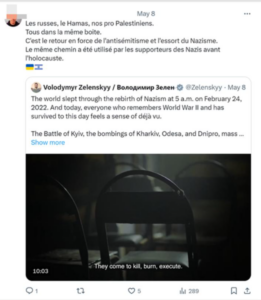
Figure 6: Post claiming that the return of antisemitism is in full force and that Hamas and pro-Palestine protestors are taking the same route as the supporters of the Nazis before the Holocaust
Translation of post of account sharing: “The Russians, Hamas, our pro-Palestinians. All in the same box. Anti-Semitism is back in force and Nazism is on the rise. The same path was used by Nazi supporters before the Holocaust.”
Many of these posts use direct comparisons to events happening during the Third Reich to illustrate their point. One Québecois right-wing extremist shared a post showing a photo of Nazis blocking Jewish students from accessing Vienna University in 1938 with a photo which has been falsely claimed to show Palestinian activists blocking Jewish students from entering Columbia University in 2024.
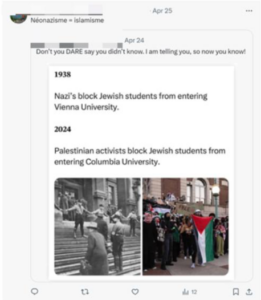
Figure 7: Post showing Nazis blocking Jewish students access to Vienna university in 1938 and Palestinian activists blocking Jewish students from entering Columbia University in 2024
Translation of post of account sharing: “Neonazism = Islamism”
Another post by a Quebec right-wing extremist account juxtaposes images of a crowd waving Swastika flags and the main gate at Auschwitz concentration camp, with protestors waving Palestinian flags in front of the Sather Gate at Berkeley University (Image 8). By lining up the gates, the image implies a strong parallel and that pro-Palestinian protests could enable another Holocaust to occur. This implication is found in the text overlaid onto the image which reads “When people ask how it was possible for Hitler to come to power and the Nazis to commit the Holocaust…”; the user’s caption reads “We are committing the same mistakes.”
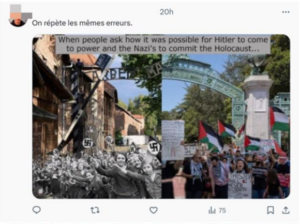
Figure 8: Post comparing pro-Palestine protestors with supporters of the Nazi regime in front of the ‘Arbeit macht frei’ gate at Auschwitz concentration camp
Translation: “We are repeating the same mistakes.”
Narrative 4: Presenting Palestinians and pro-Palestinian protestors as national security threats
Some of the right-wing extremist accounts from Quebec analysed present pro-Palestine protests and Palestinians themselves as a national security threat, and advocate against allowing Palestinians to immigrate to Canada.
The hashtag #remigration, which refers to the forced repatriation of migrant communities to create an ethnically and culturally homogenous society, is often used in relation to Palestinians, pro-Palestine protestors and Muslims living in Canada. Right-wing extremists also target specific Canadian politicians and political parties deemed supportive of the Palestinian cause. For example, the TV channel Nomos-TV, which advocates ethnonationalism, accused Justin Trudeau and the Canadian government of financing Hamas through the Muslim Association of Canada.
Narrative 5: ‘Supporting Palestine is not in the interest of the Left’
In an apparent effort to undermine the Left’s support of the pro-Palestine movement, right-wing extremists in Quebec have been posting images and memes accusing Palestinians of not sharing left-wing values, especially regarding LGBTQ+ rights. This includes posting pictures of drag queens and other members of the LGBTQ+ community involved in the pro-Palestine movement, claiming they would not survive long in Palestine or that the Hamas would kill them.
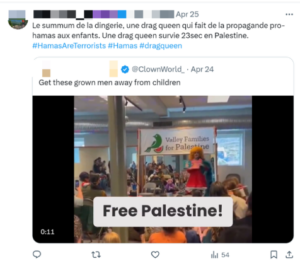
Figure 9: X post about a drag queen advocating for Palestine and that this drag queen would only survive for 23 seconds in Palestine
Translation: “The ultimate level of craziness, a drag queen spreading pro-Hamas propaganda to children. A drag queen only survives for 23 seconds in Palestine.”
A right-wing extremist Quebec nationalist account shared an image of a toad carrying a Palestine flag next to a mouse with an LGBTQ+ flag. The mouse offers their support to the toad and as a result is swallowed by the toad (Figure 10).
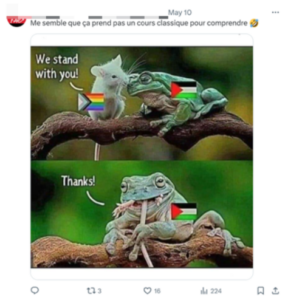
Figure 10: X post comparing pro-Palestine protestors to a mouse that is swallowed by a toad
Translation: “It seems to me that it doesn’t take a classic course to understand”
Such posts claim that Palestinians have ulterior motives and are deceiving left-wing activists into helping them to achieve their goals. It also echoes a common element of right-wing extremist narratives: that certain cultures are incompatible with Western culture because of the difference in values.
Narrative 6: Anti-Palestinian Conspiracy Theories
Several accounts on X either from or associated with Quebec right-wing extremists promoted the ‘Pallywood’ conspiracy theory which claims Hamas and other pro-Palestine actors are staging their suffering to gain support and sympathy. Additionally, accounts looked to blame Palestinians in general for the conflict and minimise Israel’s role.
In one example, a user shared a cartoon (Figure 11) characterising Palestinians as provoking Israel (using the phrase ‘Allahu Akbar’; ‘God is Great’) before presenting Palestinians as manipulating the media to present themselves as victims.
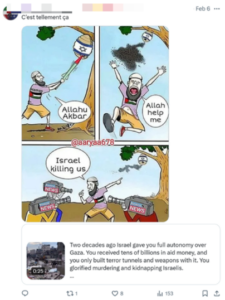
Figure 11: Post on X claiming that Hamas started the conflict with Israel but is pretending to be the victim in front of the media
Translation: “It’s exactly that.”
Another account analysed shared a two and a half hour documentary from Nomos TV called “Aucun genocide à Gaza” (“No genocide in Gaza”) explaining that the claim that Israel has been committing a genocide ‘against the Arabs in Gaza and the Judea and Samaria Area’ (the official Israeli term for the Occupied West Bank) is Hamas propaganda that has been blindly repeated by the ‘Islamo-gauchistes’ (Figure 12).

Figure 12: Post by Alexandre Cormier-Denis, the founder of Nomos TV and a well-known commentator who has previously been identified as significant in the Quebec right-wing extremist milieu
Translation: “NO GENOCIDE IN GAZA
Contrary to what Hamas propaganda repeated by its Islamo-leftist Western relays, there is no “genocide” against the Arabs of Gaza or Judea-Samaria. Live at 8pm. #polqc #Palestine #Israel”
Another right-wing extremist Quebec account on X connects this narrative to the Great Replacement theory, alleging that “The only genocide at the moment is the genocide against white Europeans in the Western world” (Figure 13). This statement was underlined with a graph showing continuous population growth of Palestinian territories since the 1960s.
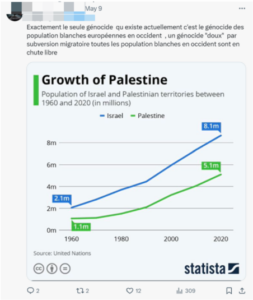
Figure 13: Post providing data on the Palestinian population growth over the past 60 years, presented as evidence that there is no genocide in Gaza and that instead there is a genocide against white people taking place
Translation: “Exactly the only genocide that currently exists is the genocide of the white European population in the West, a “soft” genocide by migratory subversion, all the white populations in the West are in free fall.”
Conclusions
Although some of the narratives shared by right-wing extremists outlined above have also been observed in Anglophone Canada, a number of key narratives studied for this investigation seem shaped by the specific context in Quebec. In contrast to their Anglophone counterparts who often hold more general anti-immigrant positions targeting a variety of ethnicities and religious groups, right-wing extremists in Quebec focus more on spreading specifically anti-Islam narratives, seeding fears around potential Islamisation and foreign infiltration of Quebec.
To this end, right-wing extremists in Quebec have sought to target and discredit the pro-Palestine movement in Quebec, claiming that the movement is part of the ongoing Islamisation of Quebec as part of the ‘Great Replacement’. Protesters are presented as a threat to Canadian society and values, comparable to Nazis, or presented as being misled or manipulated by Palestinians. Similar to their French counterparts, right-wing extremists in Quebec also present themselves as advocates for women, the LGBTQ+ community and other vulnerable communities in the context of spreading anti-Muslim narratives and capitalise on fears around Islamisation. At the same time, accounts made relatively little use of antisemitism to push their narratives, in comparison to other right-wing extremists analysed by ISD.
[1] ISD defines right-wing extremism as a form of nationalism that is characterised by its reference to racial, ethnic or cultural supremacy and advocates a system of belief in inequality based on alleged difference and the perceived threat posed by racial, ethnic or cultural out-groups. Right-wing extremism is often framed in terms of white power and commonly exhibits nationalism, racism, xenophobia, anti-democracy and strong state advocacy. The definition is broad and captures a range of extremist subcultures and harmful activity, which is reflective of the diversity of groups and trends within right-wing extremism.
[2] ISD labels accounts or channels analysed as ‘right-wing extremist’ if they:
a. Explicitly self-identify as right-wing extremists
b. Can be clearly characterised as such based on existing literature and previous research
c. Can be clearly characterised as such based on a review of a sample of content they have produced



